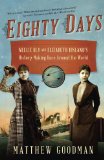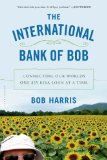Summary | Excerpt | Reviews | Beyond the book | Read-Alikes | Genres & Themes | Author Bio

A Volunteer Story
by Alison ThompsonThe Third Wave offers an unvarnished but ultimately uplifting account of Alison Thompson's day-to-day experiences as a relief worker in devastated and dangerous places around the globe. Thompson's memoir begins on the morning of September, 11, 2001 as she rollerblades toward the World Trade Center through panicked crowds fleeing the area. Thompson administers CPR to an unconscious man, then pushes on:
"Deeper into the smoke, I saw an arm elegantly pointing out of the rubble toward me. I began ripping at the chunks of cement, reaching in to yank the person free. When I pulled on it, only the arm came with me - there wasn't a body attached."
Still, Thompson "[feels] compelled to push farther into the darkness": "I saw pieces of bodies scattered about like roadkill and collected them into a pile.... I found some trash bags in a destroyed shop nearby. Even though I had worked for eight years as a nurse's aide in my mother's hospital... I felt queasy as I stuffed the torn flesh into the bags. ...Then I remembered ... my precious bottle of Chanel No. 5 perfume. I dabbed a little bit under my nose to mask the smell of burned bodies, and it worked."
Chanel No. 5 or no, the reader wonders how Thompson can plunge into these scenes of horror (In Sri Lanka, she uses her time away from the field hospital to gather bodies and body parts lost after the flooding). Thompson feels fear, disgust, exhaustion and self-doubt, but doesn't allow this to stop her from placing herself where there is the most need or where she can do the most good. At Ground Zero she accepts the fact that she is in mortal danger and, "[by] welcoming and accepting the thought of... death... felt no fear at all."
What explains disaster's pull on Thompson? She notes that her Australian childhood made her strong and adventurous, and that her missionary parents had included her in their humanitarian work. Her eight months at the World Trade Center site gave her independence, a sense of her own effectiveness, and clarity: "[It] was the first time I had worked alone on a mission of my own choosing... It also showed me that everyone - from an old lady with a tea cart, to a middle-aged lawyer willing to clean toilets, to children with love in their hearts - is needed."
Still, in Sri Lanka, and later in Haiti, Thompson's volunteer spirit is tested - by exhaustion, politics and the overwhelming needs of people who have lost everything. At first, Thompson and her fellow volunteers are welcomed: "They told us that it didn't matter if we had nothing to give them; the fact that we had come from the other side of the world... was enough to give them hope." But, even though Thompson and the other volunteers treat wounds, rebuild the school and create a tsunami-warning system, some of the the villagers who have lost everything become angry, jealous, dishonest and even cruel.
Thompson describes these disappointments, failures and betrayals as well as her triumphs and joys, because her aim is ultimately practical: She wants the reader to follow her example. At the end of the book she includes a detailed packing list for would-be volunteers, and a list of organizations to which others can donate funds to support volunteer efforts. She lets the reader know just what's required in an effective volunteer - optimism, courage, love, and inventiveness - and what isn't - special talents, or lots of money. In The Third Wave Thompson demonstrates that we're all valuable, necessary and deeply important to one another.
![]() This review
first ran in the September 21, 2011
issue of BookBrowse Recommends.
This review
first ran in the September 21, 2011
issue of BookBrowse Recommends.

If you liked The Third Wave, try these:

by Matthew Goodman
Published 2014
1889: Two women, successful journalists and writers, set off in a desperate rate in opposite directions, each determined to outdo Jules Verne's fictional hero Phileas Fogg and circle the globe in less than eighty days.

by Bob Harris
Published 2014
After making hundreds of microloans online, Bob wanted to see the results first-hand, so he travels from Peru and Bosnia, to Rwanda and Cambodia, introducing us to some of the most inspiring and enterprising people we've ever met.
Your guide toexceptional books
BookBrowse seeks out and recommends the best in contemporary fiction and nonfiction—books that not only engage and entertain but also deepen our understanding of ourselves and the world around us.